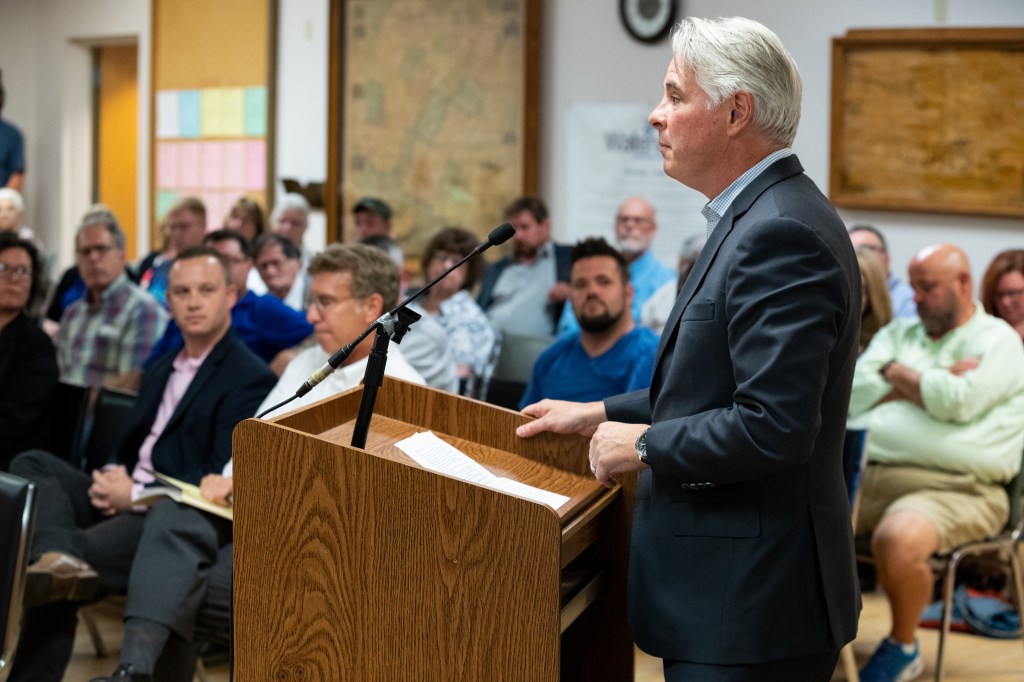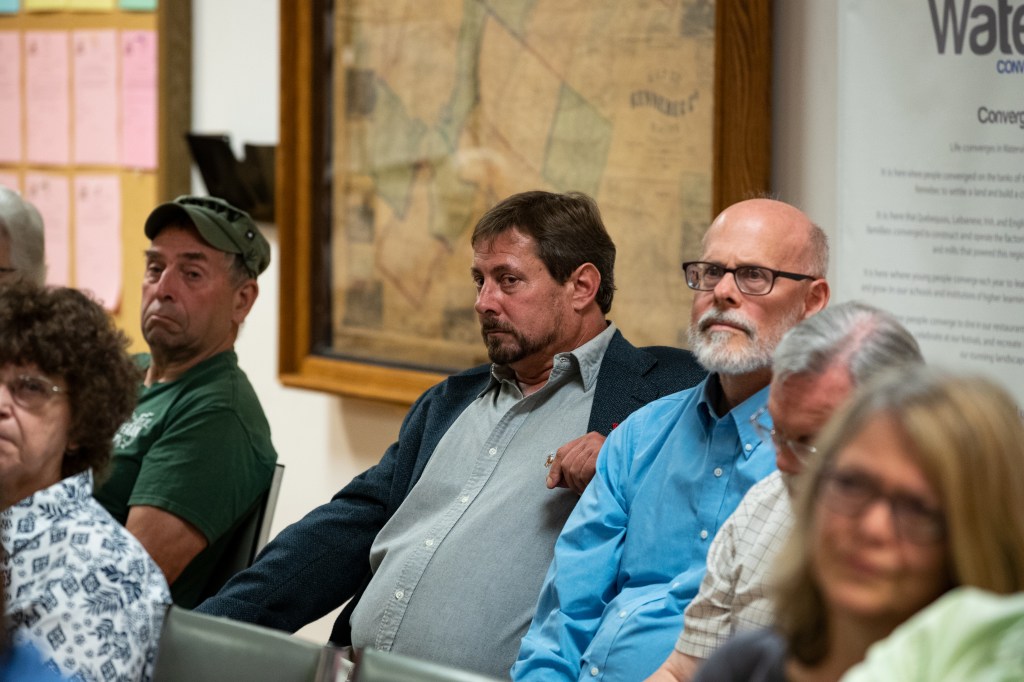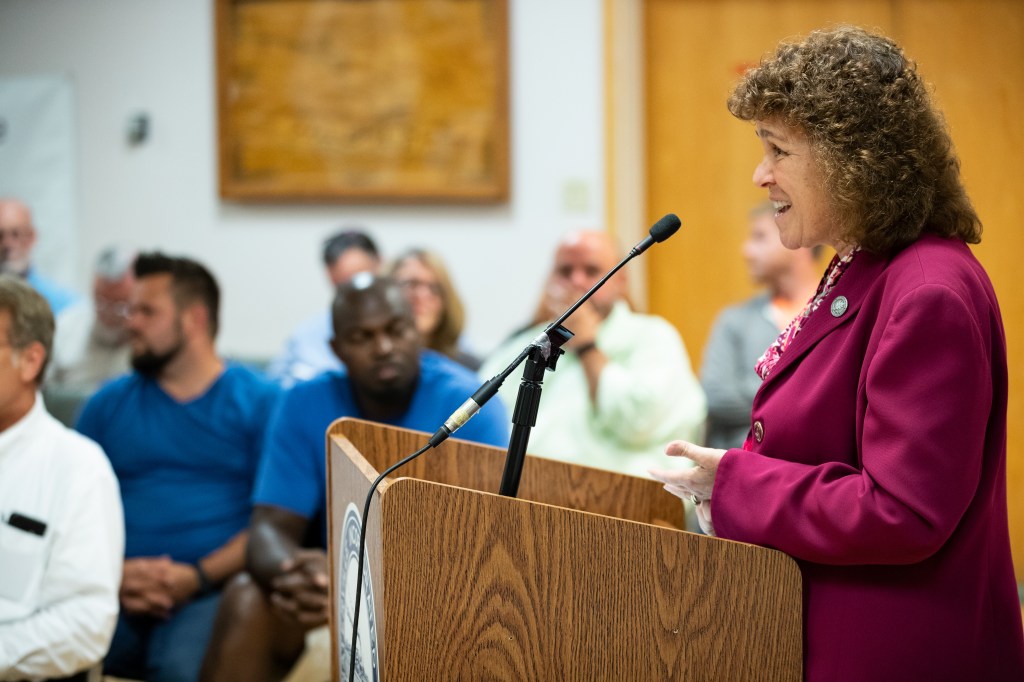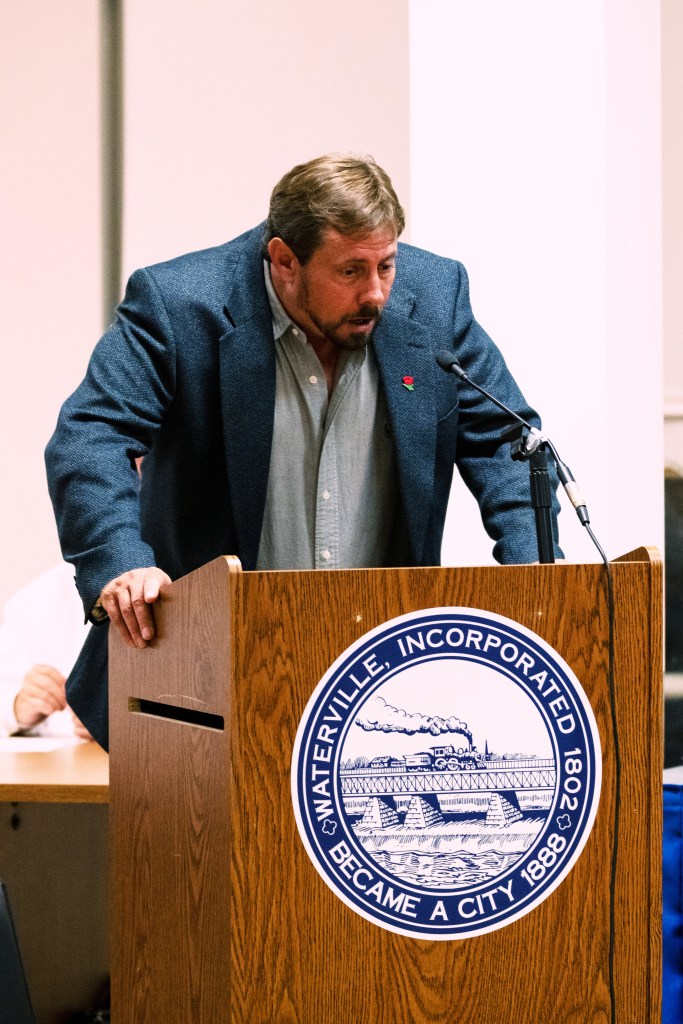WATERVILLE — The City Council on Tuesday rejected a request to submit a petition started by a candidate for the Maine House of Representatives that seeks money from Colby College and Thomas College to lower the city’s tax rate over the next five years.
Mark Andre, a Republican candidate for the House District 110 seat, said his petition has 1,071 signatures, mostly from Waterville residents, as well as business owners and employees who work in the city. He wanted the council to join him in supporting the petition and presenting it to the colleges.
The petition asks Colby and Thomas to contribute the amount of money needed to lower Waterville’s tax rate from the current $25.27 per $1,000 worth of assessed property valuation to $18.95, for a period of five years. That amount would be about $15 million, according to Andre. As nonprofit institutions, the colleges are not required by law to pay taxes.
Andre said the request would go to Thomas and Colby and not other tax-exempt properties such as hospitals or churches because the colleges already have made significant investments in the city and “you have to start with the largest player first.”
Councilor Sydney Mayhew, R-Ward 4, was the only councilor to vote to send the petition to the colleges.
He said he had talked to Andre and constituents in his ward and he does not see the petition issue as a divisive resolution.
Councilor Winifred Tate, D-Ward 6, abstained from voting because she is a Colby employee. Council Chairman Steve Soule, D-Ward 1, and councilors Nathaniel White, D-Ward 2, John O’Donnell, D-Ward 5, and Jackie Dupont, D-Ward 7, voted against submitting the petition.
O’Donnell said he is not opposed to anyone going to an entity to ask for help, but he doesn’t believe it is the council’s role to make such requests.
“For us as a government to be involved, I think this is probably wrong, so I’ll vote against it,” he said.
Dick Thomas, a psychologist, said he was uncomfortable with the petition because it makes some assumptions about what Colby can do with its finances and is disrespectful. He said he would not be uncomfortable if the city talked to Colby officials and explained it needed help.
Sandra Sullivan said she was undecided about the petition because she was afraid that if Colby steps up and helps the city out, it would give the council incentive to spend more money however it wanted.
“If anyone steps up to give this council money, then I say we need to put binders on what you’re doing with it,” Sullivan said.
Colby President David Greene and Thomas College President Laurie Lachance gave lengthy explanations about how endowment funds are used, how the colleges help the city financially when asked and how they are doing their share.
Greene said he appreciated the conversation and the intent behind the petition request and said the college believes it has an obligation to contribute to the city in a number of ways. He explained that Colby’s endowment is legally restricted money and provides $40 million a year for financial aid to students — the primary purpose of the endowment.
In the four years he has been president, about $25 million of that money has gone to students from Maine, many of whom are from Waterville.
Also over the last four years, according to Greene, $800,000 has been given to the city in direct payments, for items such as roads, Police Department support, and other areas where the city has asked for support; $500,000 in support to nonprofits, social service and economic development efforts; and $750,000 in free classes to high school students in Waterville. It is a big deal to those students and allows them to receive credit for college classes, he said, and enables them to pay less when they go to college, as they do not have to take the classes there.
Over the last four years, Colby students have given 145,000 volunteer hours to the community, which represents an estimated $3.1 million, according to Greene.
Next year, Colby is projecting to pay more than $140,000 in taxes, and its $65 million downtown redevelopment projects will result in tax revenue to the city, he said.
Colby will pay $65,000 in taxes on the Bill & Joan Alfond Main Street Commons downtown, and it negotiated to pay the city twice what it normally would in taxes. Colby’s redeveloped building at 173 Main St. pays $37,000 in taxes, whereas last year, the building generated only $4,600, according to Greene.
“We put $5.5 million into that building,” he said. “It’s now worth $1.4 million.”
Green said Mayhew called Colby a business, but any regular business would not act in that way — invest such money into a building that would be worth much less. Greene said Colby did it because it cares deeply about the city and community.
In constructing the Alfond Main Street Commons, Colby used local labor as much as possible to fill the 120 jobs on site.
“We do it because it’s important to support local business and all the jobs that those create,” Greene said.
He disputed claims that people are leaving the city, saying the population is on the rise and is higher than it has been since 1997. Mayhew and resident Catherine Weeks had said people are putting their homes up for sale because of the high tax rate.
“People are moving back into Waterville,” Greene countered. “It’s important to know the facts on this — not moving out.”
He also said home values are increasing sharply.
“We’re beginning to see signs of change that are incredibly helpful in all of this,” he said.
Greene said Colby wants to continue work with the city.
“Our goal is to be a good and enduring partner with the city of Waterville. We have worked hard to demonstrate that that is exactly what we are doing.”
Lachance said that, like Colby, Thomas strives to be a good citizen — to participate in the health and well-being of the community. Thomas, she said, supports a number of organizations including Waterville Creates!, Waterville Rocks and Waterville Rotary Club and, like Colby, offers classes to people free of charge.
Area students use the athletic fields and Thomas allows the city to use its facilities for voting. Thomas has a $12 million endowment that generates $400,000 in revenue it can put to scholarships, according to Lachance. If Thomas were to give money as Andre’s petition asks, it would be borne on the backs of students the college serves who are the first generation in their families to go to college.
Lachance suggested as a possible solution to Andre’s proposal a more comprehensive, sustainable and fairer one, with the community coming together to plan and implement Waterville’s future and take it to the state level, asking that the homestead exemption be looked at and that revenue sharing and education be fully funded. She said she humbly asked that a broader approach to the issue be considered.
Resident James Laliberty, a 2002 graduate, said he did not think the petition is a good idea.
“President Greene did a wonderful job letting us know exactly what Colby does, but it’s really not something that the council should be involved in at all,” he said.
He urged the council to vote against the petition, saying it does not represent the majority of citizens in Waterville.
In other business, Tuesday, Mayor Nick Isgro read aloud a proclamation designating Oct. 6, 2018 “Waterville Noontime Rotary Club Day” as an “expression of appreciation and respect for the club’s good work and our desire to partner for the next hundred years.” The club has been an integral part of the city’s history for more than a century and has resulted in many projects that benefited the city, according to the proclamation. The club in 2015 donated $150,000 to the RiverWalk at Head of Falls which represented the first gift to the waterfront effort.
Amy Calder — 861-9247
Twitter: @AmyCalder17
Copy the Story LinkSend questions/comments to the editors.







Success. Please wait for the page to reload. If the page does not reload within 5 seconds, please refresh the page.
Enter your email and password to access comments.
Hi, to comment on stories you must . This profile is in addition to your subscription and website login.
Already have a commenting profile? .
Invalid username/password.
Please check your email to confirm and complete your registration.
Only subscribers are eligible to post comments. Please subscribe or login first for digital access. Here’s why.
Use the form below to reset your password. When you've submitted your account email, we will send an email with a reset code.